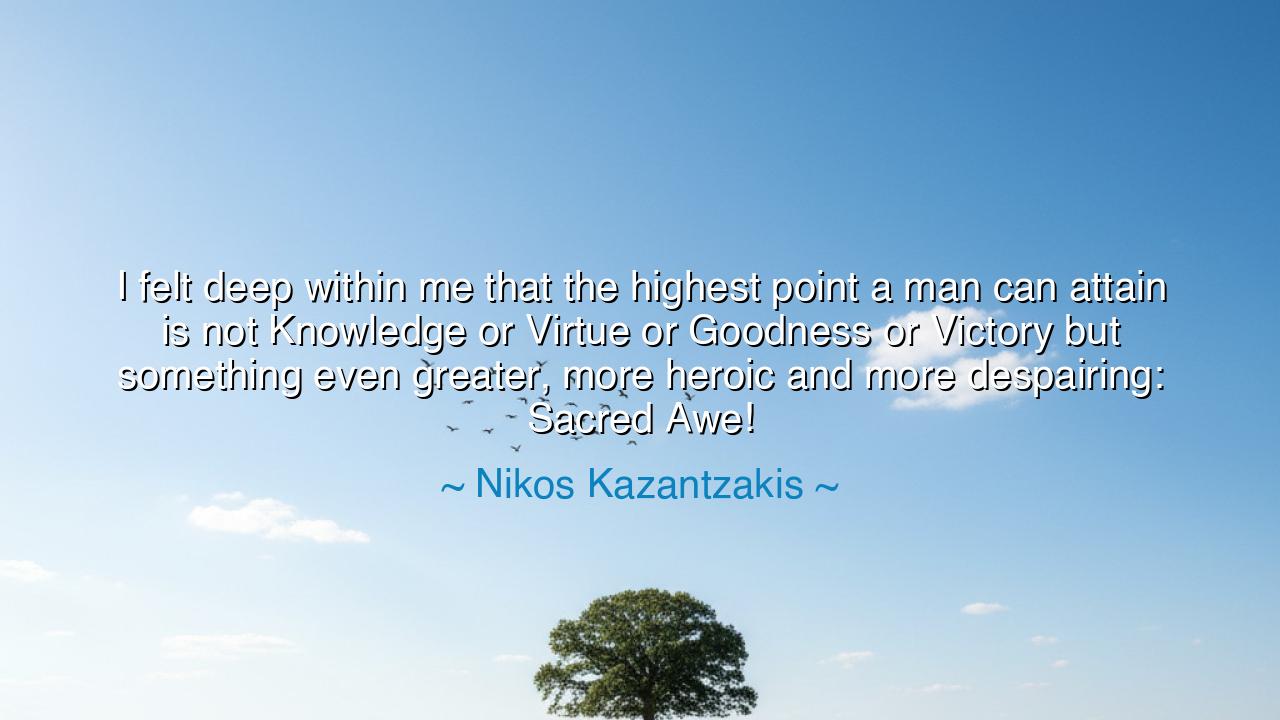
I felt deep within me that the highest point a man can attain is
I felt deep within me that the highest point a man can attain is not Knowledge or Virtue or Goodness or Victory but something even greater, more heroic and more despairing: Sacred Awe!






Hear the solemn cry of Nikos Kazantzakis, the restless pilgrim of the soul, who declared: “I felt deep within me that the highest point a man can attain is not Knowledge or Virtue or Goodness or Victory but something even greater, more heroic and more despairing: Sacred Awe!” These words rise like thunder over the mountains of human striving. For all our pursuit of knowledge, all our efforts at virtue, all our victories on the battlefield or in the spirit—Kazantzakis points beyond them. He tells us that the summit of the human journey is not mastery, but surrender; not possession, but reverence; not triumph, but the trembling fire of sacred awe.
What is this sacred awe? It is the shudder one feels before the infinite, the silence of the soul when faced with mystery too vast for words. It is the humility of one who gazes upon the stars and realizes that all human wisdom is but a drop in the ocean of eternity. It is despair, yes, for we know we shall never conquer the whole of it—but it is also heroism, for we still lift our eyes toward the ungraspable. Sacred awe is the meeting point of weakness and strength, where the human heart bows yet also rises, defeated and victorious in the same breath.
Consider the tale of Moses on Mount Sinai, who stood trembling as the mountain quaked and the heavens blazed with fire. He did not ascend to claim riches or to boast of wisdom. He ascended and was overcome by a force beyond comprehension. That moment was not simply about commandments or law—it was the encounter with the ineffable, the burning presence that no human tongue could describe. This is what Kazantzakis means: that the highest peak is not reached by reason alone, nor by moral striving alone, but by bowing before the incomprehensible vastness with sacred awe.
Kazantzakis himself was a wanderer torn between belief and doubt, hope and despair. He wrestled with faith as Jacob wrestled with the angel, never content with easy answers. His proclamation of sacred awe was born not of comfort but of anguish, the knowledge that human reason, however noble, cannot contain the infinite. In this, his vision is both heroic and despairing—heroic, because he dares to face mystery without turning away; despairing, because he knows it will always elude his grasp. And yet, in that very tension, he discovers the highest truth.
This teaching is not reserved for prophets or poets. Each of us may taste sacred awe if we allow ourselves to see beyond the veil of the ordinary. It may come when standing before the ocean as its waves thunder without end, or when holding a newborn child, or when looking into the night sky where galaxies burn unseen for billions of years. In those moments, we sense our smallness—and yet we also sense that we belong to something vast and eternal. This is the paradox: awe humbles us, but it also exalts us.
The lesson is clear: do not be satisfied with lesser peaks. Knowledge is noble, but it is not the summit. Virtue is good, but it is not the end. Victory is fleeting, for every triumph fades with time. Seek instead the moments of sacred awe, for they reveal to you the essence of existence. They strip away illusion and place you face to face with truth, not in words but in silence, not in conquest but in wonder.
So I say to you: walk with courage toward mystery. Do not fear the despair that comes when you realize how small you are, for in that despair shines the greatest light. Cultivate reverence in your heart—reverence for life, for death, for the cosmos, for the mysteries that will never be solved. Stand often in silence before the infinite. And when you do, you will know, as Kazantzakis knew, that the highest point of all is not in claiming to understand, but in bowing with trembling joy before the eternal fire of sacred awe.
Thus shall his words endure as a beacon, teaching us that beyond all human striving lies the final act of greatness: not to conquer the universe, but to revere it. Sacred awe—this is the crown of humanity, the flame that burns when all else falls away.






AAdministratorAdministrator
Welcome, honored guests. Please leave a comment, we will respond soon